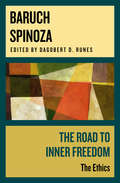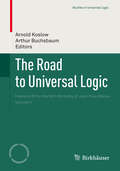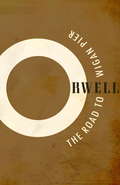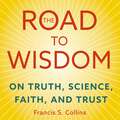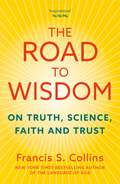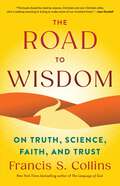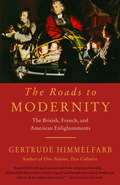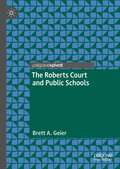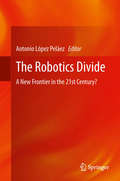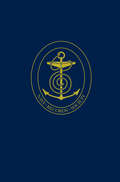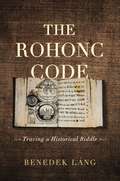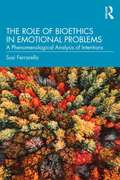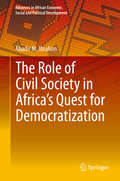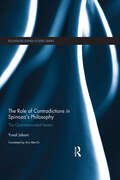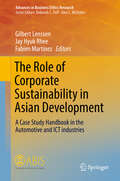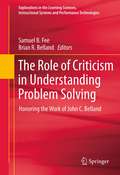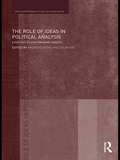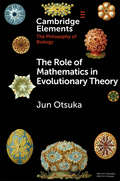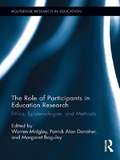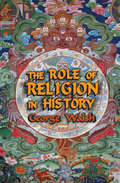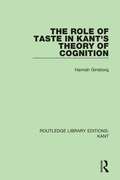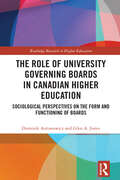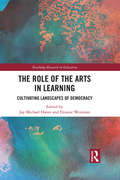- Table View
- List View
The Road to Inner Freedom: The Ethics
by Baruch SpinozaThe seventeenth century Dutch philosopher views the ability to experience rational love of God as the key to mastering the contradictory and violent human emotions.
The Road to Universal Logic
by Arnold Koslow Arthur BuchsbaumThis is the first volume of a collection of papers in honor of the fiftieth birthday of Jean-Yves Béziau. These 25 papers have been written by internationally distinguished logicians, mathematicians, computer scientists, linguists and philosophers, including Arnon Avron, John Corcoran, Wilfrid Hodges, Laurence Horn, Lloyd Humbertsone, Dale Jacquette, David Makinson, Stephen Read, and Jan WoleÅ,,ski. It is a state-of-the-art source of cutting-edge studies in the new interdisciplinary field of universal logic. The papers touch upon a wide range of topics including combination of logic, non-classical logic, square and other geometrical figures of opposition, categorical logic, set theory, foundation of logic, philosophy and history of logic (Aristotle, Avicenna, Buridan, Schröder, MacColl). This book offers new perspectives and challenges in the study of logic and will be of interest to all students and researchers interested the nature and future of logic.
The Road to Wigan Pier
by George Orwell<p>A brutally honest portrait of Depression-era British poverty, written by one of the country’s great authors. <p>One of George Orwell’s non-fiction works, The Road to Wigan Pier is an investigation of the harsh living conditions found among the poorer classes in pre-World War II northern England. <p>The first half is a direct, often blunt description of several families and homes, while the second is a more abstract consideration of the potential for socialism to improve what he sees as unacceptable circumstance for the workers. <p>He also contemplates his own privileged, middle-class upbringing. Penguin Random House Canada is proud to bring you classic works of literature in e-book form, with the highest quality production values. <p>Find more today and rediscover books you never knew you loved.
The Road to Wisdom: On Truth, Science, Faith and Trust
by Francis S. CollinsFrom world-leading scientist and New York Times bestselling author of The Language of God, a deeply thoughtful guidebook to discerning what and who we can trust to move us from societal discord to civic harmony.As the COVID-19 pandemic revealed, western society has become not just hyper-partisan, but also deeply cynical; distrustful of traditional sources of knowledge and wisdom such as science and faith. Scepticism about vaccines led to the needless deaths of at least 230,000 Americans, and "Do your own research" is now a rallying cry in many online rabbit holes. Yes, experts can make mistakes, and institutions can lose their moral compass, but there are reliable ways and means to weigh information and navigate truth, and The Road to Wisdom is here to help us rediscover them.Francis Collins reminds us of the four core sources of judgement and clear thinking: truth, science, faith, and trust. Drawing on his scientific work at the forefront of the Human Genome Project and the US National Institutes of Health, as well as on ethics, philosophy, and theology, Collins makes a robust, thoughtful case for each of these sources - their reliability, and their limits. Ultimately, he shows how they work together, not separately - and certainly not in conflict. It is only when we re-link these four pillars of wisdom that we can begin to discern the best path forward in life.Hopeful, accessible, winsome, and deeply wise, The Road to Wisdom leads us beyond current animosities to surer footing. Here is the moral, philosophical, and scientific framework with which to address the problems of our time - on the world stage, but also in our daily lives.
The Road to Wisdom: On Truth, Science, Faith and Trust
by Francis S. CollinsFrom world-leading scientist and New York Times bestselling author of The Language of God, a deeply thoughtful guidebook to discerning what and who we can trust to move us from societal discord to civic harmony.As the COVID-19 pandemic revealed, western society has become not just hyper-partisan, but also deeply cynical; distrustful of traditional sources of knowledge and wisdom such as science and faith. Scepticism about vaccines led to the needless deaths of at least 230,000 Americans, and "Do your own research" is now a rallying cry in many online rabbit holes. Yes, experts can make mistakes, and institutions can lose their moral compass, but there are reliable ways and means to weigh information and navigate truth, and The Road to Wisdom is here to help us rediscover them.Francis Collins reminds us of the four core sources of judgement and clear thinking: truth, science, faith, and trust. Drawing on his scientific work at the forefront of the Human Genome Project and the US National Institutes of Health, as well as on ethics, philosophy, and theology, Collins makes a robust, thoughtful case for each of these sources - their reliability, and their limits. Ultimately, he shows how they work together, not separately - and certainly not in conflict. It is only when we re-link these four pillars of wisdom that we can begin to discern the best path forward in life.Hopeful, accessible, winsome, and deeply wise, The Road to Wisdom leads us beyond current animosities to surer footing. Here is the moral, philosophical, and scientific framework with which to address the problems of our time - on the world stage, but also in our daily lives.
The Road to Wisdom: On Truth, Science, Faith, and Trust
by Francis S. CollinsFrom &“national treasure&” Francis Collins (Philip Yancey), the New York Times bestselling author of The Language of God and former director of the National Institutes of Health, comes a deeply thoughtful guidebook to get us beyond societal divisions and back to the sources of wisdom—"the sort that can save us before it is too late&” (Jane Goodall). As the COVID-19 pandemic revealed, we have become not just a hyper-partisan society but also a deeply cynical one, distrustful of traditional sources of knowledge and wisdom. Skepticism about vaccines led to the needless deaths of at least 230,000 Americans. &“Do your own research&” is now a rallying cry in many online rabbit holes. Yet experts can make mistakes, and institutions can lose their moral compass. So how can we navigate through all this? In The Road to Wisdom, Francis Collins reminds us of the four core sources of judgement and clear thinking: truth, science, faith, and trust. Drawing on his work from the Human Genome Project and heading the National Institutes of Health, as well as on ethics, philosophy, and Christian theology, Collins makes a robust, thoughtful case for each of these sources—their reliability, and their limits. Ultimately, he shows how they work together, not separately—and certainly not in conflict. It is only when we relink these four foundations of wisdom that we can begin to discern the best path forward in life. Thoughtful, accessible, winsome, and deeply wise, The Road to Wisdom leads us beyond current animosities to surer footing. Here is the moral, philosophical, and scientific framework with which to address the problems of our time—including distrust of public health, partisanship, racism, response to climate change, and threats to our democracy—but also to guide us in our daily lives. This is a book that will repay many readings, and resolve dilemmas that we all face every day.
The Roads to Modernity
by Gertrude HimmelfarbIn an elegant, eminently readable work, one of our most distinguished intellectual historians gives us a brilliant revisionist history. The Roads to Modernity reclaims the Enlightenment-an extraordinary time bursting with new ideas about human nature, politics, society, and religion--from historians who have downgraded its importance and from scholars who have given preeminence to the Enlightenment in France over concurrent movements in England and America.Contrasting the Enlightenments in the three nations, Himmelfarb demonstrates the primacy and wisdom of the British, exemplified in such thinkers as Adam Smith, David Hume, and Edmund Burke, as well as the unique and enduring contributions of the American Founders. It is their Enlightenments, she argues, that created a social ethic-humane, compassionate, and realistic-that still resonates strongly today, in America perhaps even more than in Europe.The Roads to Modernity is a remarkable and illuminating contribution to the history of ideas.From the Trade Paperback edition.
The Roberts Court and Public Schools
by Brett A. GeierThis unique and timely book offers a synthesis, analysis, and evaluation of education-related rulings of the US Supreme Court from 2005 to the present. Throughout the course of the twentieth century into the twenty-first century, the Supreme Court issued rulings, which frequently vacillate based on the political composition of the justices who sit on the bench. Chapters will cover both an overview of the role of Supreme Court rulings in school policy and the court’s transformation in the late twentieth century into the present day. These themes will be converted into robust chapters which will provide a legal analysis of the Roberts Court years, and an evaluation of the jurisprudence and its practical effect on public schools.
The Robotics Divide: A New Frontier in the 21st Century?
by Antonio López PeláezSocieties survive in their environment and compete with each other depending on the technology they develop. Economic, military and political power are directly related to the available technology, while access to technology is key to the well-being of our societies at the individual, community and national level. The Robotics Divide analyzes how robotics will shape our societies in the twenty-first century; a time when industrial and service robotics, particularly for military and aerospace purposes, will become an essential technology. The book, written by experts in the field, focuses on the main technological trends in the field of robotics, and the impact that robotics will have on different facets of social life. By doing so, the authors aim to open the "black box" of a technology which, like any other, is designed, implemented and evaluated according to the economic and cultural patterns of a cosmopolitan society, as well as its relations of power. The Robotics Divide explores future developments in robotics technology and discusses the model of technological development and the implementation of robotics in this competitive market economy. Then the authors examine to what extent it is possible to determine the characteristic features of the robotic divide, namely in what ways the robotic divide differs from the digital divide, and how a model to integrate this technology can be developed without reproducing patterns of inequality and power that have characterized the advent of previous technologies. These issues - inequality, robotics and power - are of concern to robotics and advanced automation engineers, social scientists, economists and science policy experts alike.
The Rodney Papers: Volume II: 1763-1780: Selections from the Correspondence of Admiral Lord Rodney (Navy Records Society Publications #148)
by David SyrettThis, the second of three volumes of the correspondence of George Brydges Rodney, covers the admiral's life from the end of the Seven Years War in 1763 until August 1780. This was perhaps his most eventful, extraordinary and controversial period; from being a successful admiral, a member of Parliament and the Governor of Greenwich Hospital, Rodney plunges into debt and a debtor's exile in France, only to rise again as a victorious admiral and as a national hero. At the end of the Seven Years War Rodney was disappointed and bitter at the failure of the British government to reward him for his prominent part in the capture of Martinique and other French islands in the West Indies. He was made baronet in 1764 and governor of Greenwich Hospital in 1765. He had already been a member of Parliament for Saltash in 1751-4, and sat for Okehampton, Penryn and Northampton consecutively between 1759 and 1774. In 1768 he was involved in one of the most costly elections in eighteenth century parliamentary history. He secured election at Northampton, but his finances were broken. Furthermore, he had begun to gamble heavily and, with a limited income, fell into the hands of moneylenders. In 1770 he attempted to recoup his finances by becoming Commander-in-Chief at Jamaica. Nevertheless in the West Indies until 1774 Rodney managed a successful period of diplomacy with Spain, of intelligence gathering, and of navigational surveying especially off the coast of Florida. Even so, he returned to England deeply in debt and was forced to flee to France to escape his creditors. The war with the American colonies proved to be Rodney's salvation. After war with France had broken out, in 1779 the British government was desperate for an admiral who could fight and win battles. Rodney was appointed Commander-in-Chief in the Leeward Islands. His success in battle and skillful conduct of the naval war in the West Indies in 1780 restored Rodney's public standing. The stage was set for his most famous victory, the Battle of the Saintes in 1782, and the restoration of his private finances. George Brydges Rodney had gone through a dramatic change of fortunes. The character of that man is revealed here. This volume will permit re-assessment of this outstanding British admiral of the American War of Independence for a new generation of historians.
The Rohonc Code: Tracing a Historical Riddle
by Benedek LángFirst discovered in a Hungarian library in 1838, the Rohonc Codex keeps privileged company with some of the most famous unsolved writing systems in the world, notably the Voynich manuscript, the Phaistos Disk, and Linear A. Written entirely in cipher, this 400-year-old, 450-page-long, richly illustrated manuscript initially gained considerable attention but was later dismissed as an apparent forgery. No serious scholar would study it again until the turn of the twenty-first century. This engaging narrative follows historian Benedek Láng’s search to uncover the truth about this thoroughly mysterious book that has puzzled dozens of codebreakers. Láng surveys the fascinating theories associated with the Codex and discusses possible interpretations of the manuscript as a biblical commentary, an apocryphal gospel, or a secret book written for and by a sect. He provides an overview of the secret writing systems known in early modern times and an account of the numerous efforts to create an artificial language or to find a long-lost perfect tongue—endeavors that were especially popular at the time the Codex was made. Lastly, he tests several codebreaking methods in order to decipher the Codex, finally pointing to a possible solution to the enigma of its content and language system.Engagingly written, academically grounded, and thoroughly compelling, The Rohonc Code will appeal to historians, scholars, and lay readers interested in mysteries, codes, and ciphers.
The Rohonc Code: Tracing a Historical Riddle
by Benedek LángFirst discovered in a Hungarian library in 1838, the Rohonc Codex keeps privileged company with some of the most famous unsolved writing systems in the world, notably the Voynich manuscript, the Phaistos Disk, and Linear A. Written entirely in cipher, this 400-year-old, 450-page-long, richly illustrated manuscript initially gained considerable attention but was later dismissed as an apparent forgery. No serious scholar would study it again until the turn of the twenty-first century. This engaging narrative follows historian Benedek Láng’s search to uncover the truth about this thoroughly mysterious book that has puzzled dozens of codebreakers. Láng surveys the fascinating theories associated with the Codex and discusses possible interpretations of the manuscript as a biblical commentary, an apocryphal gospel, or a secret book written for and by a sect. He provides an overview of the secret writing systems known in early modern times and an account of the numerous efforts to create an artificial language or to find a long-lost perfect tongue—endeavors that were especially popular at the time the Codex was made. Lastly, he tests several codebreaking methods in order to decipher the Codex, finally pointing to a possible solution to the enigma of its content and language system.Engagingly written, academically grounded, and thoroughly compelling, The Rohonc Code will appeal to historians, scholars, and lay readers interested in mysteries, codes, and ciphers.
The Role of Bioethics in Emotional Problems: A Phenomenological Analysis of Intentions
by Susi FerrarelloFollowing up from the previous book, Human Emotions and the Origins of Bioethics, thisvolume focuses on four psychological problems, anxiety, narcissism, restlessness,and emotional numbness, and explores how these problems influence bioethical issues and what bioethics can do to fix them. The Role of Bioethics in Emotional Problems presents a phenomenological exploration ofemotional intention and describes how one’s choices can determine a better relationship tothemselves and their community. Not only does this book provide the reader with an exhaustive account of the philosophical and psychological meaning of practical intentionality within Husserl’s phenomenology, but it also applies Husserl’s ethics to contemporary studies of human emotions and bioethical problems. Offering a non-reductionist model for an interdisciplinary inquiry into an emotional experience, it integrates clinical practice and articulates foundational knowledge of human emotional life at a professional level. Aimed at students of philosophy, psychology, psychotherapy, and bioethics, this book is a unique phenomenological dialogue between these disciplines on emotional well-being.
The Role of Civil Society in Africa’s Quest for Democratization
by Abadir M. IbrahimThis book tests many of the assumptions, hypotheses, and conclusions connected with the presumed role of civil society organizations in the democratization of African countries. Taking a comparative approach, it looks at countries that have successfully democratized, those that are stuck between progress and regression, those that have regressed into dictatorship, and those that are currently in transitional flux and evaluates what role, if any, civil society has played in each instance. The countries discussed--South Africa, Ghana, Nigeria, Ethiopia, Egypt and Tunisia--represent a diverse set of social and political circumstances and different levels of democratic achievement, providing a rich set of case studies. Each sample state also offers an internal comparison, as each has historically experienced different stages of democratization. Along the course of each case study, the book also considers the effect that other traditionally studied factors, such as culture, colonization, economic development and foreign aid, may have had on individual attempts at democratization. The first extensive work on civil society and democratization in Africa, the book adds new insights to the applicability of democratization theory in a non-Western context, both filling a gap in and adding to the existing universal scholarship. This book will be useful for scholars of political science, economics, sociology and African studies, as well as human rights activists and policy makers in the relevant geographical areas.
The Role of Contradictions in Spinoza's Philosophy: The God-intoxicated heretic (Routledge Jewish Studies Series)
by Yuval JobaniSpinoza is commonly perceived as the great metaphysician of coherence. The Euclidean manner in which he presented his philosophy in the Ethics has led readers to assume they are facing a strict and consistent philosophical system that necessarily follows from itself. As opposed to the prevailing understanding of Spinoza and his work, The Role of Contradictions in Spinoza's Philosophy explores an array of profound and pervasive contradictions in Spinoza’s system and argues they are deliberate and constitutive of his philosophical thinking and the notion of God at its heart. Relying on a meticulous and careful reading of the Theological-Political Treatise and the Ethics, this book reconstructs Spinoza's philosophy of contradictions as a key to the ascending three degrees of knowledge leading to the Amor intellectualis Dei. Offering an exciting and clearly-argued interpretation of Spinoza’s philosophy, this book will interest students and scholars of modern philosophy and philosophy of religion, as well as Jewish studies. Yuval Jobani is Assistant Professor at the Department of Hebrew Culture Studies and the School of Education at Tel-Aviv University.
The Role of Corporate Sustainability in Asian Development: A Case Study Handbook in the Automotive and ICT Industries (Advances in Business Ethics Research #7)
by Gilbert Lenssen, Jay Hyuk Rhee and Fabien MartinezThis book examines the challenges faced by seven multinational companies - Intel, Lenovo, Samsung Electronics, ZTE, BMW Hyundai Motor Company, Mahindra and Mahindra - in their endeavour to contribute to the economic, environmental and social development of Asia. The lessons learned from the examination of these business practices may directly contribute to an increase in the practice of sustainable management and may as such contribute to positive economic, environmental and social impact of companies in this region. The cases are highly relevant for management theoreticians seeking to deepen our understanding of corporate sustainability in an area where scholars, practitioners and policy-makers can expect new questions, problems and challenges in the years ahead. The book is also of high interest to policy review agencies, policy makers and welfare economists seeking to support the development of a comprehensive sustainability framework for managing social and environmental issues in the context of Asia.
The Role of Criticism in Understanding Problem Solving
by Samuel Fee Brian BellandIn 1991, Denis Hlynka and John Belland released Paradigms Regained, a well received reader for graduate students in the field of educational technology. The Role of Criticism in Understanding Problem Solving updates some of those ideas initially proposed in Paradigms Regained, and extends the conversation into the contemporary discourse regarding problem based learning (PBL). Paradigms proposed the idea of criticism as a third method for the conduction of educational research, the first two being qualitative and qualitative. The concept of criticism as a tool for research is not well established in educational technology, although it is well established in other educational research traditions such as Curriculum Studies. Unfortunately, it is not always clear how criticism can be applied. This book views criticism as a way to step back and look at an educational intervention within educational technology through a particular critical lens. Criticism is viewed as a valuable approach to guiding meta analyses and theoretical studies, serving to prevent the proverbial "spinning of the wheels" that often happens in educational research. By indicating new potential research questions and directions, criticism approaches can invigorate educational research. This book revisits the ideals of criticism in order to establish their usefulness for studying educational technology interventions to support problem based learning. First, a few foundational chapters set the stage for the conversations on criticism. Then, the role criticism can play in enhancing analysis and interpretation of the PBL literature is explored. Finally, case studies addressing the central concepts of the text are presented and dissected. This book represents a complete overhaul and rethinking of the use of criticism as a method for understanding and furthering the research area of PBL within the field of Educational technology.
The Role of Ideas in Political Analysis: A Portrait of Contemporary Debates (Routledge Studies in Globalisation)
by Andreas GofasDespite the proliferation of ideational accounts in the last decade or so, the debate over the role of ideas remains caught up in a series of disputes over the ontological foundations, epistemological status and practical pay-off of the (re)turn to ideational explanations. It is thus unsurprising that there is still little clarity about just what sort of an approach an ideational approach is and about what it would take to establish the kind of fully-fledged ideational research programme many seem to assume has already been developed. The contributors in this volume address these dilemmas in diverse but engagingly complementary ways. They argue that what plagues most attempts to accord ideas an explanatory role is the persistence of the perennial dualities in political analysis. In aspiring to eschew the current vogue for dualistic polemic, the present volume reveals elements of dualistic thinking in the ideational turn and assesses the impact of the persistence of these perennial dualisms in the attempt to accord ideas an explanatory role.
The Role of Mathematics in Evolutionary Theory (Elements in the Philosophy of Biology)
by Jun OtsukaThe central role of mathematical modeling in modern evolutionary theory has raised a concern as to why and how abstract formulae can say anything about empirical phenomena of evolution. This Element introduces existing philosophical approaches to this problem and proposes a new account according to which evolutionary models are based on causal, and not just mathematical, assumptions. The novel account features causal models both as the Humean 'uniform nature' underlying evolutionary induction and as the organizing framework that integrates mathematical and empirical assumptions into a cohesive network of beliefs that functions together to achieve epistemic goals of evolutionary biology.
The Role of Participants in Education Research: Ethics, Epistemologies, and Methods (Routledge Research in Education #87)
by Margaret Baguley Patrick Alan Danaher Warren MidgleyThis book explores different perspectives on the role, influence and importance of participants in education research. Drawing on a variety of philosophical, theoretical and methodological approaches, the book examines how researchers relate to and with their participants before, during, and after the collection and/or production of data; reimagining the rights of participants, the role/s of participants, the concept/s of "participant" itself.
The Role of Religion in History
by George WalshThis comprehensive survey of religion and its profound effects on history provides a historical context for in-depth analysis of theological, social, and political themes in which religion plays a major role. George Walsh first traces the rise and impact of primitive religions. He looks at Indian traditions, including Hinduism, Buddhism, and Jainism and analyzes the Semitic tradition of Judaism and Christianity and the evolving conception of a personal God. He discusses the history and chief doctrines of Islam as well, with its fundamental respect for desert tribal values and its emphasis on both the authority of God and the brotherhood of believers. Walsh then compares Judaism and Christianity. He sees Judaism as marked by a profound ambivalence between the values of tribal, nomadic desert life and the values of urban civilization, individualism, and collectivism. Judaism is "this-worldly," but the Christian worldview is "other-wordly." Walsh closes with a timely discussion of the ethical, political, and economic teachings of the Judeo-Christian tradition, focusing specifically on their differing attitudes toward sex, reproduction, and marriage; their basic views of mind and body; and man's relation to God.
The Role of Scientific Expertise in Minimum Wage Policy Making: The Cases of Germany, the United Kingdom, and the United States (Vergleichende Politikwissenschaft)
by Fabian KleinThis book examines the role of scientific expertise in minimum wage policy making in Germany, the United Kingdom, and the United States. It finds that scientific research is an important part of the public discourse on minimum wages in all three countries. Newspapers frequently cite scholars and research institutions, providing their readers with a good sense of how scientific research evaluates the effects of minimum wages. How often this happens depends on the context. Most importantly, newspapers from the United States cite researchers more frequently than newspapers from the two European countries. The book also shows that scientific research influences the policy preferences of political actors such as trade unions, political parties, and government agencies. The influence is based on policy-oriented learning. It is strong in Germany and the United Kingdom, and weaker in the United States. In both cases, cross-country differences are found to be related to different styles of using scientific expertise in the three countries.
The Role of Taste in Kant's Theory of Cognition (Routledge Library Editions: Kant #4)
by Hannah GinsborgFirst published in 1990. This title, originally a Ph. D. dissertation submitted to the Department of Philosophy at Harvard University in July 1988, grew out of an interest in the foundations of twentieth-century analytic philosophy. Believing that the idea of the primacy of judgment was an important one for understanding more recent issues in analytic philosophy, the author started to think about its historical antecedents. By examining Kant’s Critique of Judgement, Ginsborg explores the notion of a judgment of taste, as a judgment which has intersubjective validity without being objectively valid, and therefore bear’s directly on the notion of the primacy of judgment as an aspect of Kant's account of objectivity. This title will be of interest to students of philosophy.
The Role of University Governing Boards in Canadian Higher Education: Sociological Perspectives on the Form and Functioning of Boards (Routledge Research in Higher Education)
by Glen A. Jones Dominik AntonowiczThis book explores the historical and social foundations of Canadian higher education and provides a detailed analysis of university boards within this broader context of university governance. By examining rich empirical data from a sociological perspective, it offers unique insights into the role of boards, and the structures and practices that frame their work. It explores board composition, the professional backgrounds of board members, how members perceive their role, and the complex relationships between the board and the university president. The authors also compare and contrast the Canadian experience with governance reforms in Europe and other regions over recent decades. Drawing on multiple theoretical perspectives, the authors provide a nuanced analysis of the role of boards in terms of oversight, protecting university autonomy, representing societal interests, and dealing with increasing complexity and expectations. This innovative, original study makes an enormous contribution to our understanding of the role and work of Canadian university boards, and to international scholarship on higher education governance. It will appeal to scholars and researchers with interests across higher education, international and comparative education, and the sociology of education.
The Role of the Arts in Learning: Cultivating Landscapes of Democracy (Routledge Research in Education #22)
by Jay Michael Hanes Eleanor WeismanGrounded in philosophy from John Dewey and Maxine Greene, this book sheds light on difficulties and practicalities of examining culture and politics within the realm of interdisciplinary education. Providing both theoretical and concrete examples of the importance of a contemporary arts education, this book offers imaginative ways the arts and sciences intersect with democratic learning and civic engagement. Chapters focus on education in relation to diversity, apprenticeship, and civic engagement; neuroscience and cognition; urban aesthetic experience and learning; and science and art intelligence.
